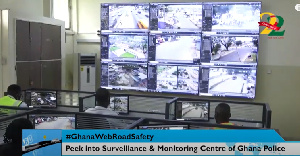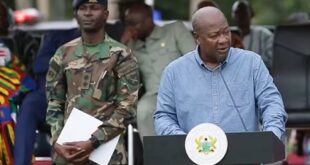This police say will help them prosecute offenders.
Some of the offences range from basic traffic infractions like jumping red lights to day light robberies.
Speaking to Media General‘s Roland Walker at the Center, Director of Police Public Affairs Superintendent Alexander Obeng said personnel on the roads have been reduced as most have been tasked to rather be behind the monitors to help in detecting offenders.
“We have personnel who are looking out and be able to detect as many as over 2,000 who have committed one road offence or the other and are being sought after among others,” Supt. Obeng said.
“So, we think that it is a clear indication that when you leverage on this alone, you may not need as many personnel as possible for drivers who are committing [crime] across the country to be forthcoming and to change their behaviour and conform.”
Over 3,000 cameras have been set up across the country, majorly at intersections.
“By this where we use silent camera to apprehend offenders among others, giving evidential material in terms of the vehicle, the make of the vehicle, the registration number among others make it so beautiful and strong for purposes of prosecution,” said Assistant Commissioner of Police, Kwesi Ofori, who is also the Acting Director General of Public Affairs.
For the Ghana Police Service, this investment of an intricate Huawei technology should give Ghanaians the confidence to not only trust its efficiency but also its abilities to reduce crime.
“If someone is going to steal something, the camera will capture that person so that we can see the person,” a resident in Accra said. “So as for me it is good.”
Another said: “There are these kidnapping issues, and robberies going on all over around so I think it is good but how to do it over this here is somehow going to be a problem.”
Supt. Obeng indicated that the Service will liaise with the Driver Vehicle and Licensing Authority (DVLA) and other state agencies in tracing offenders to get them prosecuted.
 Home Of Ghana News Ghana News, Entertainment And More
Home Of Ghana News Ghana News, Entertainment And More





